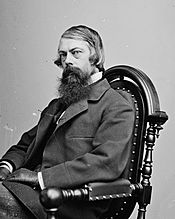Samuel G. Arnold facts for kids
Quick facts for kids
Samuel G. Arnold
|
|
|---|---|
 |
|
| United States Senator from Rhode Island |
|
| In office December 1, 1862 – March 3, 1863 |
|
| Preceded by | James F. Simmons |
| Succeeded by | William Sprague |
| Lieutenant Governor of Rhode Island | |
| In office May 1852 – May 1853 May 1861 – December 1862 |
|
| Governor | Philip Allen William Sprague IV |
| Preceded by | William B. Lawrence J. Russell Bullock |
| Succeeded by | Francis M. Dimond Seth Padelford |
| Personal details | |
| Born |
Samuel Greene Arnold, Jr.
April 12, 1821 Providence, Rhode Island |
| Died | February 14, 1880 (aged 58) Providence, Rhode Island |
| Resting place | Swan Point Cemetery, Providence, Rhode Island |
| Political party | Republican |
| Spouse | Louisa Gindrat Arnold (1828–1905) |
| Alma mater | Brown University Harvard University (Law) |
| Profession | Law, History |
Samuel Greene Arnold, Jr. (April 12, 1821 – February 14, 1880) was an important American politician. He served as a U.S. Senator for Rhode Island. He was born in Providence.
Samuel Arnold studied at home with private teachers. He later went to Brown University and graduated in 1841. He then studied law at Harvard University and became a lawyer in 1845. Besides being a lawyer, he was also a historian. He helped lead Brown University as a trustee from 1848 to 1880.
Contents
Samuel Arnold's Political Career
Samuel Arnold started his political journey in Rhode Island. He became Lieutenant Governor in 1852. In this role, he sometimes acted as the state's governor.
Working for Peace and State History
In 1859, Samuel Arnold became a member of the American Academy of Arts and Sciences. This group recognizes important thinkers and leaders. He wrote a book about Rhode Island's history called History of the State of Rhode Island and Providence Plantations.
In 1861, he joined a special group in Washington, D.C.. This group tried to find ways to stop the coming Civil War. They hoped to prevent the conflict, but war still broke out.
Serving as Lieutenant Governor Again
Samuel Arnold was elected Lieutenant Governor of Rhode Island two more times. He won in March 1861 and again in 1862. He was supported by both the Constitutional Union and Democratic parties.
Role in the Civil War
When the Civil War began, Governor William Sprague appointed Samuel Arnold as a military aide. He was given the rank of colonel. He helped create the 1st Rhode Island Battery of light artillery. This group of soldiers went to Washington D.C. and joined the Union Army for three months.
Becoming a U.S. Senator
Samuel Arnold was elected to the U.S. Senate as a Republican. He filled a spot that became empty when another senator resigned. He served in the Senate from December 1, 1862, to March 3, 1863.
After his time in the Senate, he went back to studying history. He became the president of the Rhode Island Historical Society. He led this society from 1868 until his death in 1880. He passed away in Providence on February 13, 1880, and was buried in Swan Point Cemetery.
Samuel Greene Arnold wrote a two-volume book about Rhode Island's history. It was published between 1859 and 1860.
Samuel Arnold's Family Life
Samuel Arnold married his cousin, Louisa Gindrat Arnold (1828–1905). She was the daughter of his father's uncle. He once wrote about his unique approach to finding a wife. He said he had "brought up my cousin for years to make her my wife." He felt this was the only way to find someone who suited him perfectly.
Samuel Arnold's grandnephew, Theodore Francis Green, also became a U.S. Senator from Rhode Island later on.
 | James Van Der Zee |
 | Alma Thomas |
 | Ellis Wilson |
 | Margaret Taylor-Burroughs |

